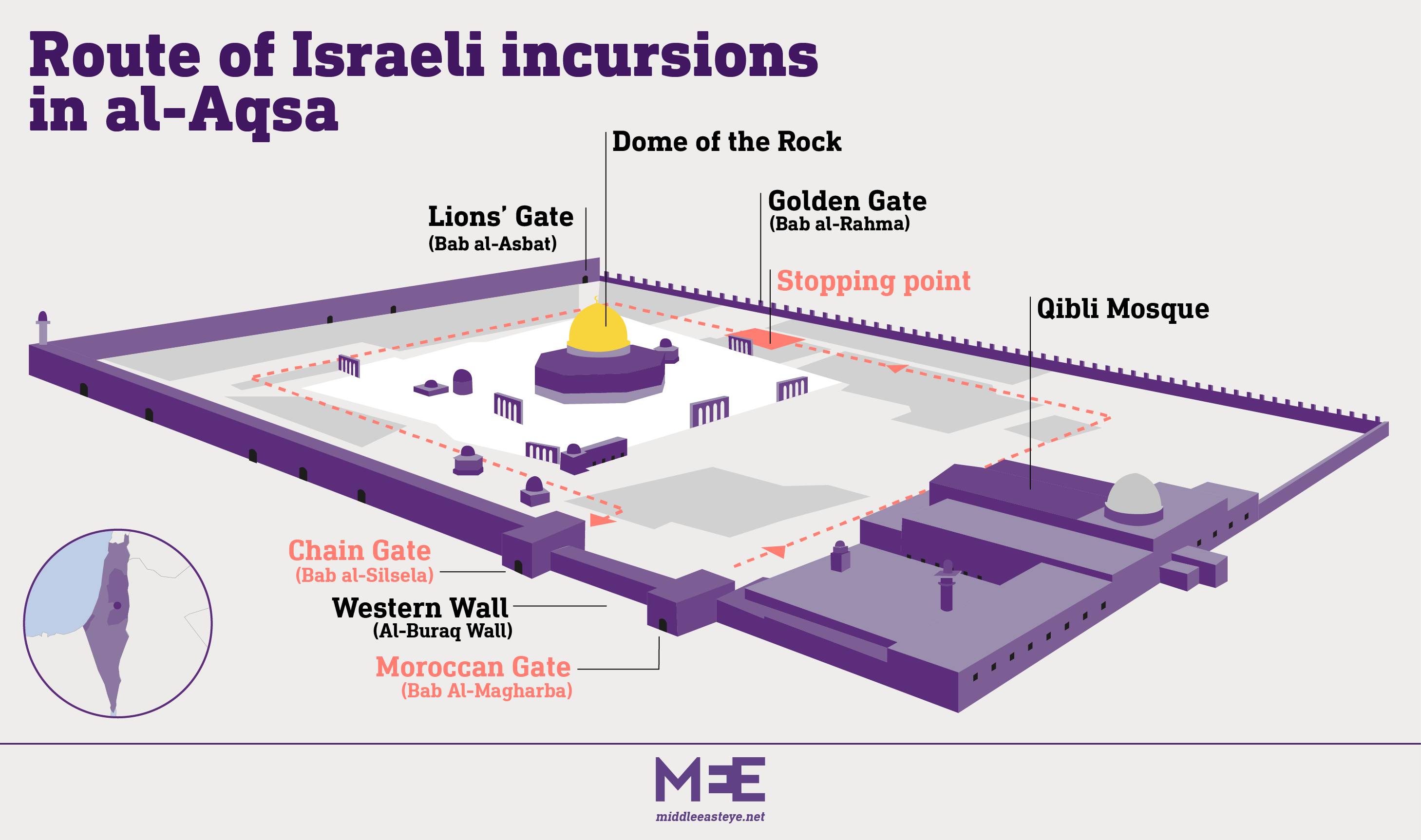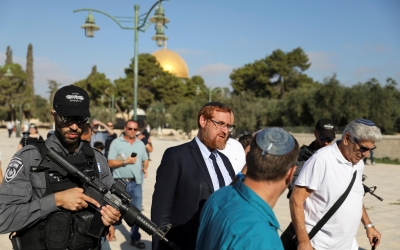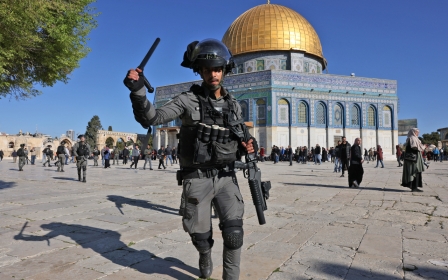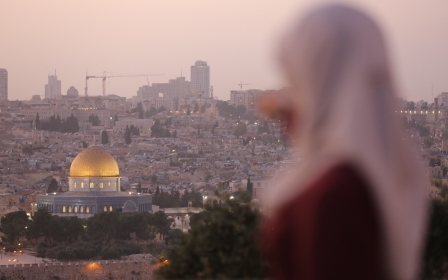Al-Aqsa: Palestinians decry unprecedented settler storming through Asbat Gate
Palestinians have condemned the entry of Israelis into Al-Aqsa Mosque during a storming by ultra-nationalists through Bab al-Asbat (Lions' Gate) as a "dangerous precedent".
The incident, which happened on 28 August, was the first time settlers entered the courtyards of the mosque from the gate, located in the northeastern section of the complex, since Israel occupied East Jerusalem in 1967.
'We view with grave concern this transgression and violation of the sovereignty of Waqf'
- Sheikh Omar al-Kiswani
Israeli ultra-nationalists, protected by heavily armed police, raid Al-Aqsa Mosque in occupied East Jerusalem on a daily basis in complete disregard to the site's Palestinian Muslim administration and a decades-old international agreement.
They enter through the southwestern Bab al-Magharba (Moroccan Gate), the only gate out of the mosque's 15 entry points under the full control of Israeli authorities which no Palestinians can access, and exit via Bab al-Silsela (Chain Gate).
While Palestinians have always protested against raids into Al-Aqsa Mosque from Bab al-Magharba, many fear allowing settlers to enter through different gates signals a move towards expanding Israeli control over the mosque and changing the status quo.
New MEE newsletter: Jerusalem Dispatch
Sign up to get the latest insights and analysis on Israel-Palestine, alongside Turkey Unpacked and other MEE newsletters
Jerusalem's Waqf, a joint Jordanian-Palestinian Islamic trust that manages the affairs of the mosque, was quick to condemn the move and warn of its consequences.
"We view with grave concern this transgression and violation of the sovereignty of Waqf, which is considered an extension of the Jordanian sovereignty," said Sheikh Omar al-Kiswani, the director of Al-Aqsa Mosque.
"We do not accept raids, whether from Bab al-Asbat, or Bab al-Magharba. What happened was an attempt to anger the Jerusalemite street, and we do not look at it in good faith."
Temple groups applaud
The incident on 28 August happened after Israeli police removed a group of ultra-nationalists from the courtyards of Al-Aqsa during one of their routine daily incursions for singing and dancing near Bab al-Rahma (Golden Gate), near Bab al-Asbat.
Later, members of the group objected, saying that they did not participate in any violations and that they had to return to the mosque. Policemen then allowed them to return via Bab al-Asbat.
The incident was filmed and shared by members of what is referred to as "Temple groups", a number of far-right Israeli organisations, mostly from the Religious Zionism movement, that arrange incursions at Al-Aqsa Mosque, which they refer to as "ascension to the Temple Mount".
Temple groups advocate for the destruction of Al-Aqsa Mosque, where they believe two ancient Jewish temples once stood, to make way for a third temple.
Beyadenu, one of those organisations, hailed the breakthrough on Sunday and said the entry happened "smoothly without any problems".
It added that this precedent should be repeated and be turned into a formal procedure, especially during Jewish holidays, when the number of Israelis raiding the mosque increases.
Following angry reactions by Palestinians, who have long warned against expanding Israeli control over Al-Aqsa Mosque, Israeli police said no changes were made to the "status quo" and denied allowing settlers to enter through al-Asbat.
The status quo refers to an understanding since 1967 between Jordan - the custodian of Islamic and Christian sites in Jerusalem - and Israel, which regulates visits to Al-Aqsa Mosque.
Under the delicate arrangement, non-Muslims are allowed to visit Al-Aqsa only under the supervision of the Waqf, a provision that Israel has been violating since 2000.
Palestinians have expressed doubt about the police statement, saying that such decisions could not have been taken by field officers alone and would not have happened without prior coordination.
Kiswani said Temple groups and police are "always in full harmony", and he urged Jordanian authorities to raise the issue urgently with Israeli officials.
Unprecedented violations
The al-Asbat event comes amid a series of unprecedented violations this year to the Jordanian-Israeli understanding regarding visits to Al-Aqsa Mosque.
The agreement stipulates that non-Muslims can visit with the approval of the Waqf but cannot perform any non-Muslim religious rituals inside the confines of the mosque, nor display national symbols.
Before 2000, the Waqf controlled the visits of non-Muslims through a booking system, but this was rescinded by Israel after the Second Intifada, or uprising, which ended in 2005.
In May, an Israeli court ruling suggested it is not unlawful for Jewish prayer to be held in the courtyards of the mosque after police put a restraining order against three Israeli far-right activists for praying at the site.
The ruling was later overturned by an appeals court, but Palestinians said it was not enough, as scores of settlers have increasingly been seen performing Jewish rituals and prayers during their raids without any interruption by police.
In late May, an Israeli flag was raised for the first time in recent memory inside the mosque, again without police interference. The violations were repeated on 7 August, when hundreds of settlers stormed the mosque to mark the Jewish holiday of Tisha B'av.
With the Jewish New Year and Sukkot holidays coming up, in late September and early October respectively, larger settler stormings of Al-Aqsa are expected, with Palestinian officials warning they could be used to cement these changes.
Why Bab al-Asbat?
Bab al-Asbat is a joint name for two gates separated by a distance of 50 metres, one of which is the gate for Jerusalem's Old City wall on the eastern side. The other is the gate of Al-Aqsa Mosque from its northern side. Historically, they are separated by a square called Al-Ghazali Square.
The gate, with its two doors, holds strategic importance for both Palestinians and Israelis and has long been a major flashpoint in the city. It is one of the main entrances for Muslim worshippers, especially those coming via vehicles or buses, due to the presence of parking spaces near it.
It is also close to the sensitive area of Bab al-Rahma, a site which was sealed off by Israeli forces in 2003 but reopened by Palestinians in 2019 after fierce confrontations.
Historically, Bab al-Asbat was one of the main gateways through which Israeli paratroopers invaded the Al-Aqsa Mosque when Israel occupied the city in 1967.
A police station was later established adjacent to the city gate and directly overlooking the mosque's entrance.
Outside the gate, Israelis often hold religious rituals, especially on holidays, such as the lighting of candles on Hanukkah.
'[The raid] is a continuation of a historical policy that aims to create a permanent entry point for settlers to the al-Aqsa from the eastern side'
- Ziad Ebhais, Palestinian researcher
Bab al-Asbat was also the scene of one of the major protest movements in Jerusalem in 2017, when hundreds of Palestinians held mass demonstrations against the installation of electronic gates by Israeli authorities. After two weeks of what became known as the "uprising of al-Asbat", the Israelis removed the electronic detectors.
Ziad Ebhais, a Jerusalem-based researcher, told Middle East Eye the choice of settlers to enter through Bab al-Asbat last week comes in line with a long and ongoing effort to control the gate.
"Raids through Bab al-Asbat today are not just the work of one odd policeman," Ebhais, whose work focuses on the affairs of Al-Aqsa Mosque, said.
"It is a continuation of a historical policy that aims to create a permanent entry point for settlers to Al-Aqsa from the eastern side, in parallel with entry from the Moroccan Gate from the western side," he added.
The timing is also not innocent, Ebhais said, coming nearly a month before large stormings planned for Jewish holidays starting from late September.
"It has come as they prepare for a long month of aggressions."
Middle East Eye delivers independent and unrivalled coverage and analysis of the Middle East, North Africa and beyond. To learn more about republishing this content and the associated fees, please fill out this form. More about MEE can be found here.






